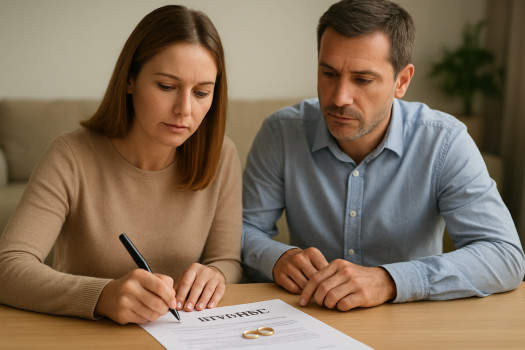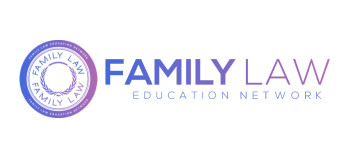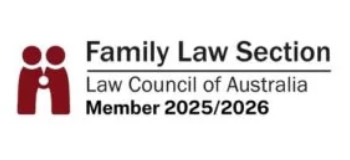Divorce Lawyers Based in Brisbane and Helping People all Across Australia
Find Clarity, Support and a Way Forward
You may feel hurt, uncertain or overwhelmed. You’re not alone. You’ll be supported by divorce lawyers who listen, care, and act decisively.
Divorce is one part of the puzzle that needs sorting out after the end of your relationship
When a relationship ends, it’s completely normal to feel overwhelmed and unsure about what needs to happen next. Many people think that “getting a divorce” covers everything – parenting arrangements, dividing property, spousal maintenance, child support.
In reality, divorce is simply the legal step that ends the marriage. The rest are separate (and often more important) parts of the process that need to be handled carefully. If you are not sure where to start or what applies to you, you are not alone, and our experienced lawyers are here to guide you through it all, step by step.


Divorce is Emotional - You Need a Strong Lawyer on Your Side
Divorce can feel like your world is collapsing. Whether you’re ending the relationship or responding to it, you might be facing fear, anger, betrayal or deep uncertainty.
You’re not just dividing assets – you’re potentially navigating emotional trauma, financial stress, and possibly parenting arrangements, all at once.
This is where clear, calm legal guidance changes everything. Our lawyers will ensure you feel heard, informed, and confident in your next steps.
Here’s What Happens When You Contact Your Divorce Lawyers...
Talk With an Experienced Lawyer
Quick response – no delays and you will speak with a expert, understanding lawyer who cares.
Get Clear Answers About Your Rights
We’ll explain what’s possible and how the law applies to your specific case - in simple, plain English.
Feel Clear and Confident Moving Forward
Whether you engage us or not, you’ll leave the call with certainty and direction.


Led by an Accredited Family Law Specialist
When everything feels uncertain, it helps to know you’re being guided by a team led by one of Queensland’s most qualified family lawyers.
Less than 3% of solicitors in Queensland hold the title of Accredited Specialist in Family Law. It’s not a marketing term – it’s formal recognition from the Queensland Law Society that Jill Johnstone, Principal of The Law People, is among the top-tier experts in the state.
For you, that means:
- Advice that’s precise, strategic and fully aligned with current legal standards
- Representation from someone trusted by peers, judges, and clients alike
- Fewer delays, fewer missteps, and a smoother path to resolution
In complex or high-stakes matters – especially involving children, property, or financial disputes – that level of expertise can make a real difference in your outcomes.
What truly sets this team apart is that legal skill never comes at the expense of personable service. You’ll feel it from the first conversation – real understanding, practical advice, and guidance that puts your best interests at the centre.
So if you’ve been searching for family law advice you can truly trust – you’ve just found it.
Trusted & Recognised Memberships, Associations and Affiliations






What Clients Say After Working With Us
Trustindex verifies that the original source of the review is Google. Very happy with the service, advice I received from Skye, Felicity and team. Very professional, and listened to my needs to provide good advice. Highly recommendTrustindex verifies that the original source of the review is Google. Jill and the team are professional, responsive and very knowledgeable. I have no reservations in recommending the law peopleTrustindex verifies that the original source of the review is Google. Jill Johnstone and The Law People team always provide exceptional service from start to finish which is why Rouse Lawyers confidently refers its clients who need expert and experienced family law solicitors to them. The Law People know how to guide clients through every step, making potentially stressful situations more manageable. Clients benefit from The Law People’s incredible knowledge and genuine care for client well-being.Trustindex verifies that the original source of the review is Google. Jill and the team are fantastic. I highly recommend them for any family law matters.Trustindex verifies that the original source of the review is Google. The staff at The Law People are total pros. They are friendly, supportive and above all they get results. Highly recommend, particularly if you are a woman who is nervous about being taken seriously.Trustindex verifies that the original source of the review is Google. Wonderful team to work with.Load more
Divorce Law in Plain English - What You Need To Know...
- Divorce only ends the marriage. A divorce does not decide parenting arrangements, property/financial settlement, child support or spousal maintenance. Those are separate processes under family law.
- There is a 12-month waiting period from the date of separation to be able to apply for a divorce order, but you can start resolving parenting, financial settlement, spousal maintenance and child support before divorce.
- You can be legally separated but still live under the same roof – this is called ‘separation under one roof’.
- Australia has a no-fault divorce system. The reason why the relationship has ended is totally irrelevant.
- The Court filing fee to make an Application for Divorce is $1,125 (or $375 if you have a concession card or meet the financial hardship criteria.

Common Questions About Divorce
Divorce is often thought of as the first legal step after separation, but in Australia it only deals with formally ending the marriage, it does not cover property settlement or parenting arrangements. Because of this, many people are unsure about when they can apply, what the process involves, and how it affects other family law matters.
Below we have answered some of the most common questions about divorce in Australia. This is general information only and not legal advice. For advice specific to your situation, please contact The Law People to speak with an experienced family lawyer.
Does a divorce resolve all matters following my separation?
No, Divorce proceedings do not finalise the arrangements regarding children and finances or property – a divorce application solely deals with the legal end of your marriage.
If you wish to seek these types of orders (parenting and/or property), or resolve these matters directly with your spouse you will need to either negotiate directly with them, or file a separate application seeking court orders.
See information where we describe these processes here: TLP Link to parenting page & TLP Link to property page. The Court’s website also provides useful information here: Children and/or Finances and property.
How do I get a divorce in Australia?
To obtain a divorce in Australia, you must apply to the Federal Circuit and Family Court of Australia. The only ground for divorce is that the marriage has broken down irretrievably, demonstrated by 12 months of separation. You can apply:
- Solely (one party files), or
- Jointly (both parties file together).
The application is lodged online via the Commonwealth Courts Portal. You must serve the application on your spouse if applying solely, and pay the current filing fee (as of 1 July 2025, the fee is $1,125, with possible fee reductions available – see here).
What documents will I need to file for Divorce?
In most cases:
- a copy of your Marriage certificate
- your ID
- any Australian Citizenship Documents (if applicable).
- copies of any other family law or court documents filed (including parenting plan, any orders made and any domestic violence applications).
During a complimentary 15 minute consultation with one of our lawyers, we will be able to ascertain from you what is needed to prepare an application (and any supporting documents needed) and can give you an estimate of the likely legal and court filing fees for you to consider if you would like us to act for you.
Take the First Step Toward Clarity and Control
You don’t have to do this alone. Let’s take one calm, informed step together.
Divorce Lawyers Brisbane - Frequently Asked Questions
How long do you have to be separated before you can get divorced?
You must be separated for at least 12 months before applying for divorce. This 12-month period can include time living separately under the same roof, provided certain criteria are met (see next question). If you reconcile for more than 3 months, the 12-month clock resets.
Can we live in the same house and still be separated?
Yes — this is called “separation under one roof.” You must prove that the marital relationship has broken down, even though you live in the same residence. Evidence might include:
- Sleeping in separate bedrooms,
- Separate social lives,
- Financial separation,
- Informing friends and family of the separation.
You will need to provide an affidavit (and one from a supporting witness) explaining the circumstances. Often people ask us to assist prepare this Affidavit to ensure sufficient evidence is provided to the Court to satisfy the requirements of being separated under one roof.
During a complimentary 15 minute consultation with one of our lawyers, we will be able to ascertain from you what is needed to prepare an application addressing being separated under one roof, and can give you an estimate of the likely legal and court filing fees.
Do I need a reason to get divorced in Australia?
No. Australia has a “no-fault” divorce system under the Family Law Act 1975. This means that the Court does not consider who was at fault in the breakdown of the marriage.
This is different to other countries where evidence of adultery may be a sufficient reason.
In Australia, the only legal requirement is proof that the marriage has irretrievably broken down – which is proven by 12 months’ separation.
How much does it cost to get a divorce?
There are several possible costs associated with making a divorce Application. These are:
- Costs of preparing the Application (if you engage us to prepare this for you)
- Any supporting documentation required (such as supporting affidavits) (if you engage us to prepare this for you)
- Serving the Application on the other party (if not a joint application) – these are fees payable to a third-party process server
- Obtaining a copy of your Marriage Certificate payable to Births Deaths and Marriages (link)
- Attending the hearing (if you engage us to attend on your behalf, if required)
As at August 2025, the Court filing fee is $1,125 (as at 1 July 2025), with possible fee reductions available.
You may be eligible for a reduced fee of $375 if you hold a concession card or meet financial hardship criteria.
A financial hardship application looks at your income, day-to-day living expenses, liabilities and assets to see if they are at such a level that payment of the full fee would cause you financial hardship.
During a complimentary 15 minute consultation we will be able to ascertain from you what is needed to prepare your application, and can give you an estimate of the likely legal and court filing fees.
How long does a divorce take?
From filing to the final divorce order, the process usually takes around 4–6 months, assuming there are no delays. The timeline:
- File the application,
- Serve the other party (if not a joint application),
- Attend a hearing (if necessary),
- If successful, the divorce becomes final one month and one day after the hearing.
At this time, your divorce order will be available for you to download from the Commonwealth Courts Portal the next working day after the order has become final.
Once you have the Divorce Order, you can then apply to remarry (if you choose to do so).
Once a divorce order is made, there are seriously time limitations that come into play regarding financial settlement and spousal maintenance. If you have not resolved these matters prior to finalising your divorce, we strongly encourage you to contact us to speak about this further to understand these timeframes and your legal obligations/rights.
What happens if my spouse won’t agree to a divorce?
It doesn’t matter, a divorce can proceed without the other party’s consent if you:
- Prove 12 months’ separation,
- Properly serve the application on them (if a sole application),
- Provide all required supporting evidence.
The Court will not refuse to grant a divorce just because one spouse objects.
Can I apply for a divorce if I was married overseas?
Yes — provided:
- Your marriage is legally recognised in Australia,
- You or your spouse is:
- An Australian citizen,
- An Australian permanent resident, or
- Ordinarily resident in Australia for at least 12 months prior to filing.
You must provide a certified translation of your marriage certificate if it’s in a language other than English.
I’m living overseas – can I still apply for a Divorce in Australia?
Yes — if you are currently living overseas, you may still be eligible to apply for a divorce in Australia. However, the Court can only grant a divorce if you or your spouse meet the legal eligibility requirements under the Family Law Act 1975.
To apply in Australia, at least one party to the marriage must:
- Be an Australian citizen, or
- Be ordinarily resident in Australia and have lived here for at least 12 months before filing, or
- Regard Australia as their permanent home and intend to live here indefinitely.
If neither you nor your spouse meet these criteria, the Court does not have jurisdiction to hear your application, and you may need to seek legal advice in the country where you are currently residing.
What if I am eligible but currently overseas?
If you meet the eligibility criteria but are located overseas:
- You must provide an Australian address at Question 10 of the divorce application. This can be the address of a family member or friend who is willing to receive mail and pass on any documents.
- You can still list your overseas residential address at Question 9.
If you’re filing a joint application, both parties must provide an Australian address for service.
Do I need a lawyer to get divorced?
No — you can complete the divorce application yourself through the Commonwealth Courts Portal. However, many people engage a lawyer if:
- There are complex parenting or property matters,
- You are unsure whether you meet the legal requirements,
- There are issues with service or separation under one roof.
A divorce itself is separate from property division or parenting arrangements, which often do require legal assistance.
During a complimentary 15 minute consultation with one of our lawyers, we will be able to ascertain from you what is needed to prepare your application, and if we consider you are able to file the Application yourself, we will advise you of that. If we believe you would benefit from having us act for you, we will give you an estimate of the likely legal and court filing fees.
What’s the difference between separation and divorce?
- Separation: The date you or your spouse decide the relationship has ended (you don’t need to agree). You can be separated and still legally married.
- Divorce: The legal termination of the marriage, requiring a Court order. You cannot remarry until your divorce is finalised.
Separation starts the clock for the 12-month requirement to apply for divorce,
Once a divorce Order is made, this starts the clock for the 12-month limitation for spousal maintenance and property applications.
What is my name is different now?
If the name you use now is different from your married name or maiden name you will need to file an affidavit explaining the difference in names.
Do I have to attend the divorce hearing?
In most cases, attending your divorce hearing is not required, especially if the application is straightforward. However, there are situations where your attendance is necessary or strongly recommended:
You must attend the hearing if:
- You have requested to attend in your application;
- Your spouse (the Respondent) has asked to attend the hearing and there are children under 18;
- Your spouse has filed a Response to Divorce opposing the application;
- You are applying for an order for substituted service or dispensation of service because you are unable to locate your spouse to serve them with court documents.
It is advisable to attend if:
- You have been separated under one roof, and the Court requires further explanation by affidavit;
- There has been a change in your circumstances since you filed the application;
- You are relying on additional affidavit material to explain unusual aspects of your relationship or separation.
If your spouse has filed a Response to Divorce:
- If they do not oppose the divorce, neither of you are required to attend the hearing.
- If they oppose the divorce, both parties must attend. If you don’t attend, the Court may treat your application as abandoned and dismiss it, even if your spouse’s opposition is weak.
If any of the above circumstances apply to you, we strongly encourage you to speak with one of our lawyers for a complimentary 15 minute consultation where we will be able to ascertain what is needed to ensure your application has the best chances of success. During that call we can give you an estimate of the likely legal and court filing fees.
Do I have physically have to go to Court for the Hearing?
No, Divorce hearings are conducted by telephone (or electronically), not in person.
Even if you’re not required to attend, you may still elect to do so by indicating your preference in the divorce application form.
What if I cannot locate my spouse to divorce them ?
The divorce application asks for your spouse’s address for service. If you are unable to locate your spouse, even after you have taken all reasonable steps to locate them you can put their address as ‘unknown’. You will need to upload a further application seeking an order to dispense with service or for substituted service. We strongly recommend engaging us to act on your behalf to assist with this Court Application.
